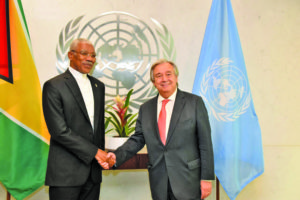President David Granger has reiterated his Government’s commitment to the course of action outlined by former United Nations Secretary General Ban Ki-moon regarding the Guyana-Venezuela border controversy.

with UN Secretary General António Guterres
He made this clear during his meeting with incumbent Secretary General, António Guterres on Monday.
In a special interview in New York earlier Tuesday, the President said that the engagement with Guterres offered an opportunity to seek clarification and to be updated on the progress that has been made thus far. “Yesterday’s meeting was largely what you will call a situational report and a commitment on the part of Guyana to remain engaged…We will continue to exchange views with the intention of bringing this matter to a successful closure,” President Granger is quoted as saying by the Ministry of the Presidency.
Before demitting office last year, the former Secretary General, in his assessment on the way forward, declared that the matter would be referred to the International Commission of Jurists (ICJ) if significant progress was not made by the end of 2017. Moreover, Guyana has been cooperating fully with the Secretary General’s Personal Representative, Norwegian diplomat Dag Nylander, who has been working closely with the Guyanese and Venezuelan Governments.
In his address to world leaders at the 72nd Session of the UN General Assembly, President Granger explained that Guyana remained imperilled as a result of Venezuela’s claims to its territory. “Guyana warns the world, through this Assembly, that peace will be at stake in our Region if justice does not become ascendant, not only within Venezuela, but also in respect to its border controversy with Guyana,” he said to the Assembly.
For decades, Venezuela has laid claim to nearly two-thirds of Guyana’s landmass – the Essequibo.
The border controversy, which was not on Venezuela’s front burner for several years after being first officially mooted in 1962, was reignited by the country, when US oil giant ExxonMobil began exploratory works in the Stabroek Block offshore the Essequibo.
With Guyana on the verge of becoming a lucrative oil-producing nation, Venezuelan President Nicolás Maduro issued a decree purporting to claim the majority of Guyana’s waters.
The decree was seen as a flagrant violation of international law and was inconsistent with the principle that all States should respect the sovereignty and territorial integrity of other States.
In an effort to defend its sovereignty, Guyana made it clear to the Venezuelan Government that the Essequibo and its offshore waters belong to Guyana, and strengthened its push for judicial settlement of the issue, as the Good Officer Process had yielded little result. The border between the countries was set by an international tribunal in 1899, in an award the parties, including Venezuela, had agreed would be the final settlement. Since the belligerence from Venezuela, moves have been made by the international community, including the UN Secretary General, to push for a peaceful resolution of the issue.
President Granger and President Maduro had met with the former UN Secretary General for the first time in September 2015 to discuss the controversy.
It was decided by Ban that the two countries would return to the Good Officer Process for a period of one year. However, if no progress is made by the end of this year, the matter would be referred to the International Court of Justice (ICJ).



